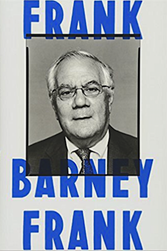A WRITER'S WIT |
My Book World

from the Great Society to Same-
SexMarriage. New York: Farrar, 2015.
In this tersely written memoir (yet verbose in places), Frank memorializes his forty years of public service. Though I find the word “service” can have a false ring with people in the US Congress who, over time, increase their wealth considerably, such a word rings strong and true with regard to Barney Frank. For four decades he serves, in one capacity or another, the people of Boston, Massachusetts—but also many citizens from coast to coast. During his tenure as congress member, he evolves into an ace legislator who is instrumental in getting landmark legislation through Congress: undoing Don’t Ask, Don’t Tell, strengthening laws that govern Wall Street (Dodd-Frank) after 2008, and any number of LGBTQ issues. He has a way of stating the truth that only stings if you are the guilty party:
“If every issue is always on the active agenda, if an issue that was already disposed of by a majority can be reopened whenever the side that lost regains an advantage, instability infects not just the body that made that decision but also the society that it is governed by. It is the explicit rejection of that principle by the Tea Party Republicans that contributes heavily to political gridlock. A representative or senator’s effectiveness thus is based on his or her ability to deal with a very wide range of issues, with never enough time, and with little guidance from others” (73).
“In a civilized society that needs a profit-driven private sector and a tax-funded public sector, it is all the people’s money. The task facing sensible people is to distinguish between the personal or family needs and wants best fulfilled by individual spending choices and those societal goals that can be achieved only if we pool our resources to buy collective goods” (171-2).
“Representative government in a capitalist society involves the coexistence of two systems—an economic one, in which a person’s influence necessarily increases with his or her wealth, and a political one, in which every citizen is supposed to have an equal say. If the mechanisms of the free market are going to work, that is, if they are going to increase productivity through incentives and allocate resources efficiently, money must drive decisions. For democracy to fulfill its moral promise, everyone’s vote should have the same weight in making the rules by which we govern ourselves” (183). Hallelujah, he should be teaching civics in high school!
“Democrats will regain a fighting chance to win majority support among working- and middle-class white men only when we demonstrate the will—and capacity—to respond to the economic distress inflicted on them” (187).
“The NRA does what I have long begged my LGBT allies to do, at first with mixed results, and more recently with much greater success. They urge all of their adherents to get on the voting rolls. They are diligent to the point of obsession in making sure that elected officials hear from everyone in their constituencies who opposes any limits on guns, especially when a relevant measure is being considered, and they then do an extraordinary job of informing their supporters of how those officials cast their votes” (203).
NEXT TIME: New Yorker Fiction 2017



 RSS Feed
RSS Feed